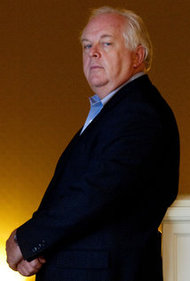The official, whom the Komsomolskaya Pravda newspaper identified as Anatoly Shesteryuk, worked for the Federal Property Management Agency and was in charge of companies in Moscow owned by the federal government.
Most of Russia’s profitable public companies were privatized in the immediate post-Soviet period, creating a capitalist economy and overnight billionaires. The state companies that were not privatized were of dubious commercial value; many limped into the new century barely profitable.
These companies were the focus of the corruption investigation that ensnared Mr. Shesteryuk and at least two other co-conspirators, said the Main Economic Crime Directorate of the Interior Ministry, which divulged details of the case in statements published by several Russian newspapers.
To pull off the plot, the investigators said, Mr. Shesteryuk and the other suspects, who were directors of private companies, worked from a database of failing government enterprises — the worse off, the better.
Mr. Shesteryuk, the investigators said, would arrange for the managers of these failing companies, like gas stations and other businesses with substantial real estate holdings, to take out loans using their land as collateral, and drawn from a financial company that was also part of the plot. When, predictably, the struggling enterprise was unable to repay the loan, the land was seized in bankruptcy court, and the conspirators — who included the managers of the failing companies — would divide the proceeds.
The plot led to the theft of more than 100 parcels of state property worth more than 10 billion rubles, or about $330 million, the Komsomolskaya Pravda article quoted an unnamed investigator as saying.
The investigators said they were looking into whether the judges in the Treteysk court, where the bankruptcies were processed, were complicit in approving the title changes.
The plot, though eyebrow-raising for being so lucrative, was not unprecedented for corruption cases here.
Sergei L. Magnitsky, a lawyer representing a hedge fund, uncovered what he said was a plot against the Russian government in which taxes paid by at least two investment firms were stolen. Some estimates put the amount involved at more than a half-billion dollars.
Mr. Magnitsky, who was arrested in November 2008 as he tried to expose the fraud and died in prison, said about $230 million in taxes paid by his employer, the Hermitage Capital hedge fund, had been stolen. Collusive lawsuits in Russia’s flawed court system were also a factor in that case.
In 2010, a leaked audit suggested that as much as $4 billion had gone missing in a contracting fraud involving a pipeline project to connect Siberian oil fields with a refinery in China.
In neither case were any senior figures prosecuted.
But arrests have been made in more recent corruption cases. Since Vladimir V. Putin was elected to a third term as president last spring, the police have made half a dozen high-profile arrests for corruption. In November, Mr. Putin ousted his minister of defense in a corruption scandal, and the police have arrested housing officials in St. Petersburg and state telephone company executives in Moscow.
Selective prosecution of corruption cases, Kremlinologists say, serves to purge the elite of figures who have fallen from favor or whose loyalty has been called into question.
Removing the most visible signs of corruption and making high-profile arrests are also seen as a way to mollify the anger of Russians — who must pay bribes in many ordinary situations, as when they visit an emergency room — lest they embrace the opposition.
Also on Tuesday, Prime Minister Dmitri A. Medvedev fired a deputy minister of regional development who is also director of the federal agency for housing maintenance and utilities, the Interfax news service reported, without providing an explanation for the dismissal.
And far to the east, in the Siberian city of Yakutsk, the police accused a regional official in the same housing agency of taking a $9,000 bribe from a contractor.
Article source: http://www.nytimes.com/2012/12/26/world/europe/anatoly-shesteryuk-russian-former-official-arrested.html?partner=rss&emc=rss
